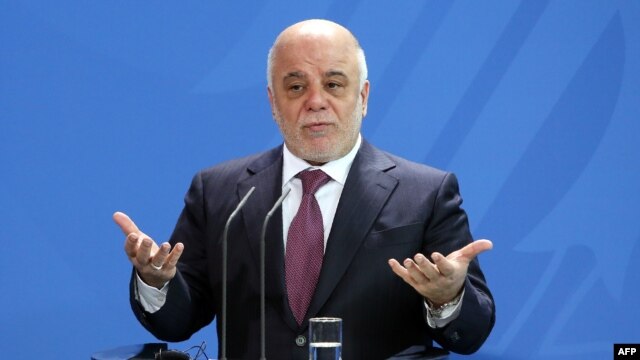Iraqi premier names new cabinet of 'technocrats' to fight corruption
| Publisher | Radio Free Europe/Radio Liberty |
| Publication Date | 1 April 2016 |
| Cite as | Radio Free Europe/Radio Liberty, Iraqi premier names new cabinet of 'technocrats' to fight corruption, 1 April 2016, available at: https://www.refworld.org/docid/5768ffd018.html [accessed 30 May 2023] |
| Disclaimer | This is not a UNHCR publication. UNHCR is not responsible for, nor does it necessarily endorse, its content. Any views expressed are solely those of the author or publisher and do not necessarily reflect those of UNHCR, the United Nations or its Member States. |
April 01, 2016
By RFE/RL
 "They were chosen on the basis of professionalism, competence, integrity, and leadership ability," Iraqi Prime Minister Haidar al-Abadi said of his new cabinet choices. (file photo)
"They were chosen on the basis of professionalism, competence, integrity, and leadership ability," Iraqi Prime Minister Haidar al-Abadi said of his new cabinet choices. (file photo)
Iraqi Prime Minister Haidar al-Abadi has named 14 new cabinet ministers who he said are the kinds of policy experts protesters have been demanding for months to fight corruption in the government.
Abadi presented his choices to the parliament, where they could meet resistance from politicians who prefer the system of political patronage that has helped many of them acquire power and wealth.
"They were chosen on the basis of professionalism, competence, integrity, and leadership ability," Abadi said of the proposed candidates, one of whom is a descendant of Iraq's deposed king.
In announcing the sweeping change, Abadi said he is reducing the number of cabinet ministers to 16 from 21. The only two ministers who were not replaced were the defense and interior ministers, "given the hard situation" they face in waging a new offensive against the Islamic State militant group to recapture the northern city of Mosul, he said.
The announcement prompted influential Iraqi cleric Muqtada al-Sadr to end a two-week sit-in by his followers in Baghdad's Green Zone, where they had been demanding the replacement of political cronies in the cabinet with technocrats.
Sadr praised Abadi's "brave step" and urged lawmakers to quickly vote on the new lineup. He warned legislators that they would face street protests if they attempt to block the government overhaul.
Lawmakers, who thwarted previous efforts at reform proposed by Abadi, said they would take up to 10 days to respond to the new cabinet plan.
Sadr's followers erupted into celebration in the streets when they heard the news.
Among key appointments, Nizar Salem al-Numan was named oil minister, prominent Shi'ite politician Ali Allawi was named finance minister, and Sharif Ali bin al-Hussein, a relative of Iraq's king deposed in 1958, was given the slot of foreign minister, state television reported.
Abadi's move delivers on his promises to hire people and enact sweeping measures to fight corruption that is pervasive in Iraq's government. Iraq ranks among the lowest countries worldwide in measures of government integrity.
"Most of [the nominees] have academic credentials, but they all have experience of working in a senior executive position, managing or administrating," Sajad Jiyad, an Iraqi political analyst, told Reuters.
Numan, the candidate for oil minister, is a Kurd from the town of Dohuk, where he has held several administrative positions at Dohuk University.
Allawi, the finance nominee, would be coming back to a post he filled a decade ago in Iraq's transitional government following the U.S.-led invasion in 2003. The U.S.-educated former banker also served as minister of trade and minister of defense in a previous cabinet.
"The IMF will be immensely happy with Allawi," said Jiyad.
The International Monetary Fund said this week it could approve as early as June a standby arrangement with Iraq, unlocking $15 billion in badly needed international assistance over the next three years.
Hussein, the prospective foreign minister, worked as an investment banker in London before the 2003 invasion that toppled Saddam Hussein. He briefly advocated a return to monarchical rule and heads the Constitutional Monarchy Movement.
With reporting by Reuters, AP, and AFP
Link to original story on RFE/RL website
